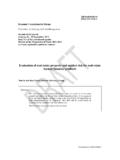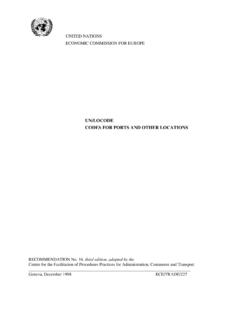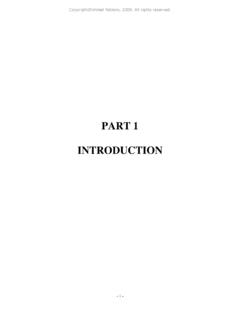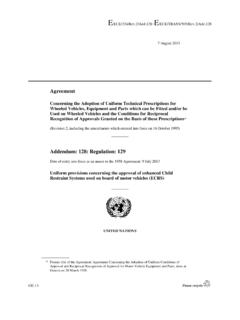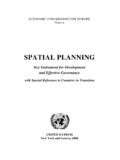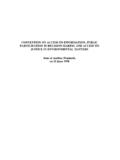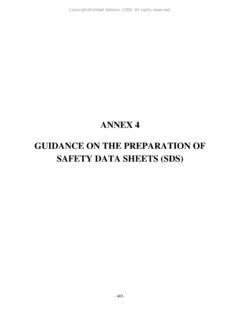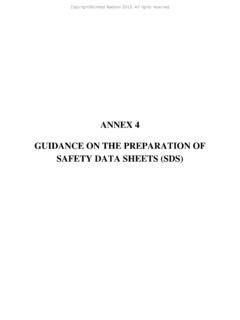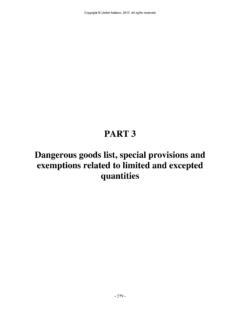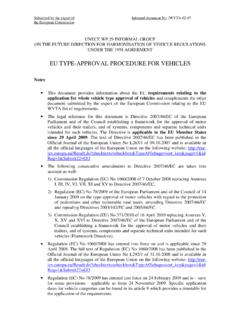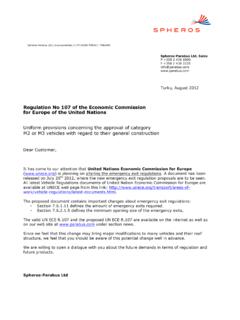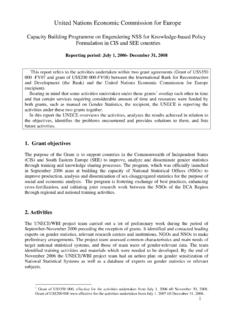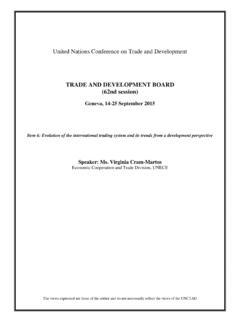Transcription of United Nations Economic Commission for Europe - unece.org
1 United Nations Economic Commission for Europe Regulatory and Procedural Barriers to Trade in Belarus Needs Assessment United Nations New York and Geneva, 2012 Note The designation employed and the presentation of the material in this publication do not imply the expression of any opinion whatsoever on the part of the Secretariat of the United Nations . Copyright United Nations , 2012 All rights reserved worldwide United Nations Publication ECE/TRADE/403 Preface by the Secretariat Following discussions among member States on the future direction of the unece Committee on Trade, the Executive Committee (EXCOM) recommended at its thirty-fourth meeting of February 2010 that the Committee carry out, before 2013, three trade needs assessment studies in countries with transition economies (ECE/EX/5).
2 The Secretariat expresses its gratitude to Government of the Russian Federation for financing the studies through the Russian Voluntary Contribution Fund made available to the unece . Executive summary An upper-middle-income, landlocked country, Belarus has been implementing since the early nineties comprehensive reforms to consolidate a market economy. Ranging from macroeconomic stabilization to Economic liberalization measures, these reforms emphasize regional cooperation as a stepping-stone towards global integration. However, Belarus is yet to reap the full benefits in areas such as new export markets, and technology transfer, with its economy showing continued reliance on extractive industries and light manufactures.
3 Furthermore, development gains are jeopardized by inflation, growing fiscal imbalances and reduced access to international capital markets, all of which suggest fragile macroeconomic stability. These challenges come at a time when the global economy is still struggling to recover from the Economic crisis, and when labour-intensive products have lost their competitive edge. This means that, as it forges ahead with its macroeconomic reforms, Belarus needs to concentrate on restructuring the economy to allow for greater specialization in technology-intensive production with high value-added. In so doing, it needs to go beyond the important requisite of developing its enterprises' productive capacities and address non-tariff regulatory and procedural barriers to trade.
4 Otherwise, Economic and trade-development efforts are likely to be defeated by high transaction costs, which reduce the competitiveness of enterprises in local, regional and international markets. Similarly, unless these barriers are addressed, Belarus will not be able to fully benefit from its participation in the Customs Union (CU) with Kazakhstan and the Russian Federation. Based on the unece comprehensive evaluation methodology, this study highlights the need to address a number of behind and at-the-borders regulatory and procedural barriers to trade. These are spread across the international supply chain as follows: Many traders lack capacity in areas such as export-import processes, quality management and marketing.
5 These traders also: lack up-to-date information on new/revised export-import procedures and regulations as well as on emerging trading opportunities; have limited access to trade finance; and can draw only on a narrow range of trade insurance services. The traders' ability to establish presence in new export markets is undermined by capacity shortfalls in the standardization, quality assurance, accreditation and metrology (SQAM) infrastructure. The lack of certifying testing laboratories; risk management methodologies to support the surveillance function; and systemic coordination between main stakeholders are among the areas that require immediate action.
6 Documentary requirements are complex, time-consuming and costly to obtain. The management of these requirements demands considerable skill and resources, adding to the traders' overhead costs. Delays at the borders, particularly on the import side, are caused, in large part, by over-reliance on physical inspection by some border-control agencies and a lack of coordination among the agencies. The overland (road and rail) transport system seems to be unresponsive to client needs in terms of its ability to provide customer-oriented services at a competitive cost, and in terms of longer-term capacity. Introduction Beyond these barriers, the study points to a number of capacity shortfalls that cut across all the processes supporting international trade transactions.
7 These shortfalls point to the necessity for immediate measures to: Foster participatory approaches to planning and policy formulation, which involve a dialogue between stakeholders from the public and private sectors. Consolidate and further develop inter-agency coordination at both the planning and implementation levels. Increase private-sector participation in the provision of transport and logistics services. Develop the information and communication technology (ICT) infrastructure to support greater use of internationally recognized electronic business standards and instruments. The evaluation also reveals challenges to coordinating efforts with CU partners.
8 A major challenge will be to implement the common technical regulations that were introduced in early 2012. Yet another relates to the CU partners' uneven capacities in the area of electronic business and the use of electronic documents. Addressing these challenges falls beyond the scope of this study, and would require a separate assessment targeting the CU as a whole. This study proposes a number of action-oriented measures for supporting Belarus s efforts to address the identified barriers. These measures are clustered under two headings: i) trade facilitation and ii) regulatory cooperation and standardization policies. As the proposed measures require substantive financial resources beyond what is currently available to the government and market support institutions, the need for international assistance cannot be over-emphasized.
9 Moreover, in order to ensure the sustainability of these measures, unece is assisting Belarus to establish a plan that spreads the implementation of recommendations by priority over several years in cooperation with trade and development partners. List of recommendations Trade facilitation 1. Establish a public-private sector forum on trade facilitation 2. Foster inter-agency cooperation and joint-action at the border 3. Simplify trade procedures and streamline documentary requirements 4. Help traders and State agencies comply with e-document requirements 5. Create a system for mapping CU data requirements to international standards 6. Establish a coordinated approach to risk management at the border 7.
10 Broaden the scope of trade information dissemination and facilitate access 8. Encourage greater competition among trade-related service providers 9. Develop the railway network Standardization and technical regulations General 10. Establish a national programme to help SMEs comply with quality standards and technical regulations 11. Establish a national quality forum 12. Develop a regulatory impact assessment (RIA) system 13. Adopt new risk management tools 14. Bolster Gosstandart's institutional capacity Metrology 15. Develop compliance testing laboratories 16. Enter into mutual recognition agreements 17. Strengthen metrology and legal metrology 18. Strengthen the metrological system for food products 19.
